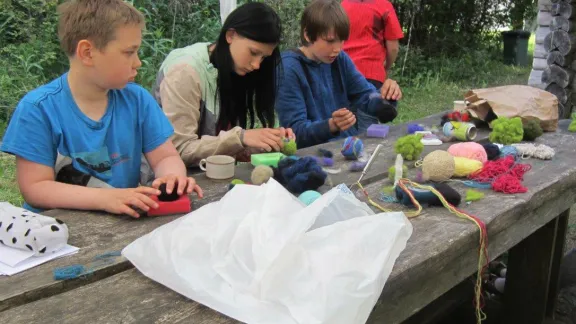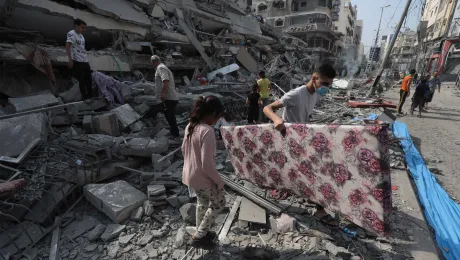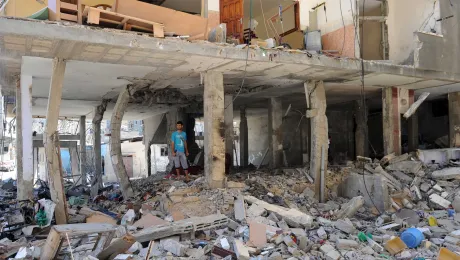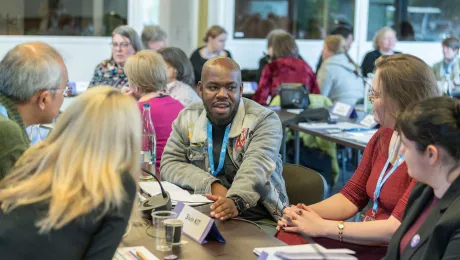
Children from Peeteli in a 2014 summer camp organized by the EELC on Saaremaa island, Estonia. Photo: Avo Ãprus
TALLINN, Estonia /GENEVA, 27 February 2015 (LWI) - When Rev. Avo Üprus became pastor of the Peeteli congregation in Tallinn, northwestern Estonia in 1995, he and his congregation began working with prisoners, homeless children and drug users.
They invited these marginalized people to live in the church then helped them to live together in an apartment. Today the congregation offers meals for children, employs one of the girls in its kitchen and organizes summer camps with Nordic church partners.
The 50 children they feed regularly at the Peeteli congregation of the Estonian Evangelical Lutheran Church (EELC) focus on the question, ‘Who are you?’ As they get to know the church community better, word spreads among the children that the church is a trustworthy place to get help.
“First, we should restore a person, a human being and not put them into prejudiced boxes like criminals,” Üprus commented recently while introducing visitors to his congregation’s diaconal ministry. “We need to start with giving and restoring respect.”
This holistic approach of diakonia is one of the initiatives that will be shared at The Lutheran World Federation (LWF) workshop on “Convivial Economy” taking place, 2-6 March, in Manchester, United Kingdom. Üprus alongside 25 diaconal actors from across Europe and guests from Africa and Asia will also report on new ways of working and making policy changes.
The Lutheran Church in Great Britain is hosting the workshop, which is being organized by the LWF Europe desk at the Department for Mission and Development in collaboration with the International Academy for Diaconia and Social Action (interdiac) in the Czech Republic.
The convivial economy concept emphasizes the principle of justice, vocation and dignity to reverse concentration of wealth, income and power in a few hands and create a more equal distribution of society’s goods in order to reduce poverty and exclusion.
Collaborative Actions
Participants will visit several projects in Manchester that relate to the workshop sub-themes: debt, corruption and transparency, welfare and work, migration, and creation and the environment. They will reflect on the themes from theological and ethical standpoints then work on collaborative actions.
They will also share stories from their regions on the impact that economic pressures are having on marginalized communities, vulnerable groups and forgotten places. They will reflect on what Lutheran theology and biblical sources offer regarding economy and work.
In Estonia, Üprus is working to develop his congregation’s notion of convivial economy, creating a community church that works with economically vulnerable families while forging collaboration among churches and other partners. The church will hold a conference this year to further these goals.
The LWF European Diaconal Process published its first results in 2013 in the document Seeking Conviviality: Reforming Community Diakonia in Europe. Conviviality – the art and practice of living together, in solidary and sustainable communities, has become a focal lens for transforming diaconal action in European churches.
“I hope the Manchester workshop, with its focus on ‘convivial economy’, will lead us to address background challenges of sustainable community throughout Europe. It is also an opportunity to identify how we can build up concepts and action towards an economy that safeguards dignity and justice as cornerstones of living in community,” said Rev. Dr Eva-Sibylle Vogel-Mfato, LWF area secretary for Europe.
Vogel-Mfato noted that this year’s meeting includes guests from other LWF regions. “Living in a globalized economic world, we seek collaboration and reciprocal learning with colleagues from the Lutheran communion in the global South,” she added.
The LWF European Diaconal Process began in 2011, and this will be the second gathering in its 2014-2016 phase. In 2014 the diaconal actors focused on enhancing electronic platforms and the theme for 2016 will be convivial theology.


